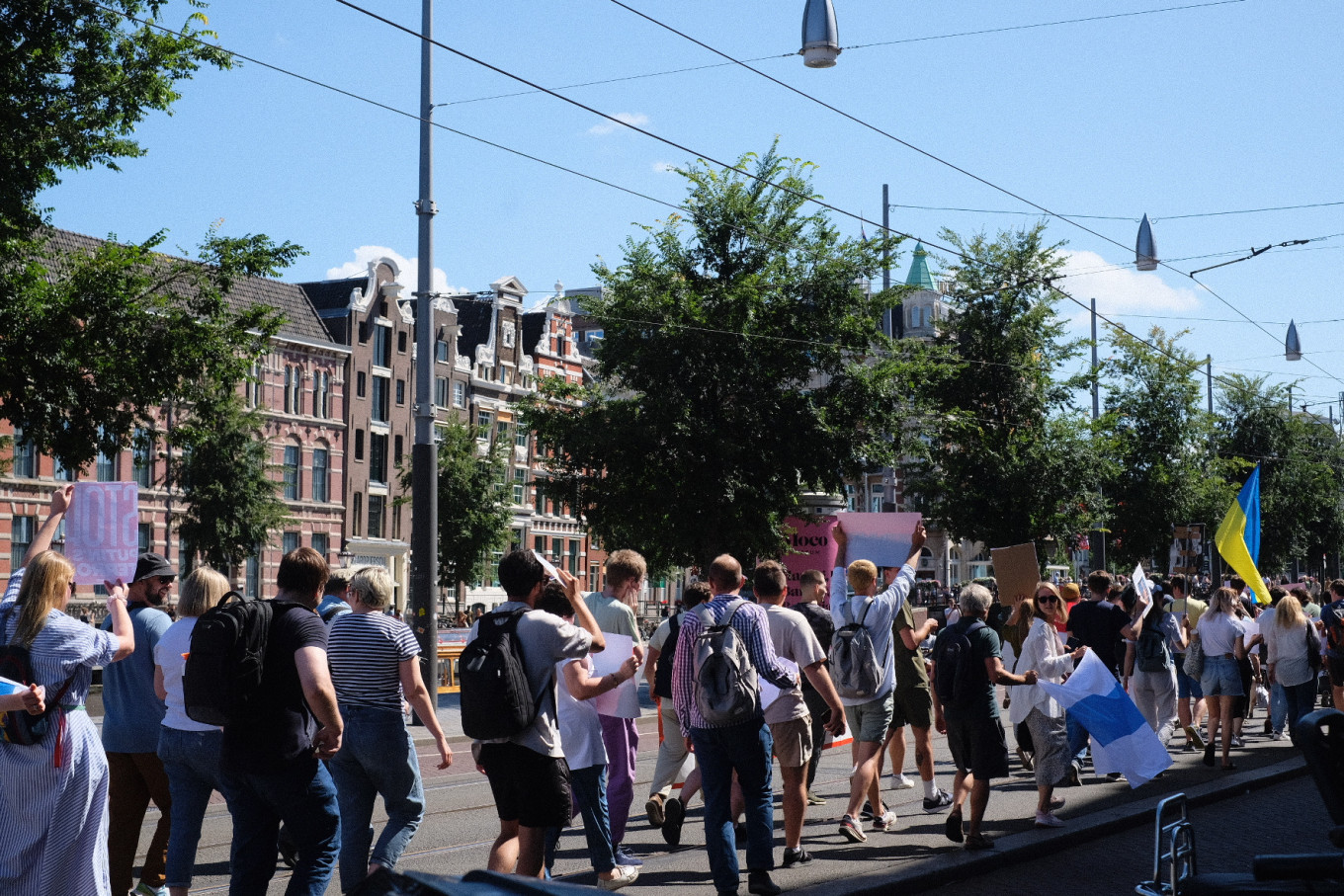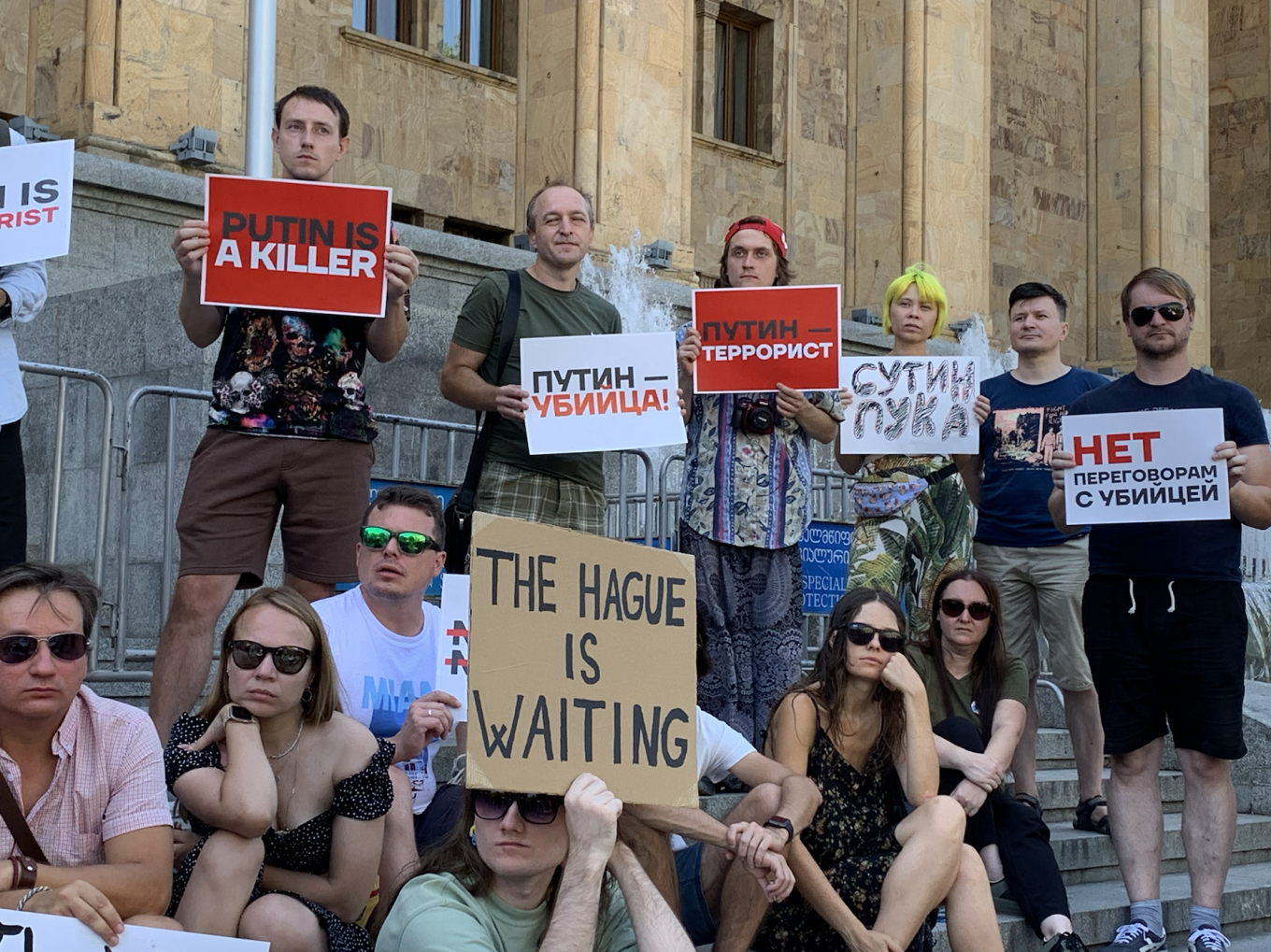Hundreds of people around the world took part in protests Sunday against Russian President Vladimir Putin and his violent actions in Russia and abroad.
The protests, titled “Putin Is a Killer,” were organized by jailed Kremlin critic Alexei Navalny’s associates on the three-year anniversary of his near-fatal poisoning that he blames on Putin, and took place nearly 18 months into Russia’s deadly invasion of Ukraine.
Protests were seen in mainly Western countries, such as Australia, New Zealand, Israel, South Korea, the United States, Britain and European countries, as well as in countries with large Russian emigre populations such as Georgia and Armenia.
In the Dutch capital Amsterdam, around 100 demonstrators marched through the city center, holding signs reading “Za mir [For peace],” “Stop Putin’s terror” and “Putin to The Hague.”
“A year and a half has passed [since the invasion of Ukraine], everyone knows that Putin is a killer. But we need to remind people in Europe that it’s not possible to negotiate with him and make any concessions,” Vladimir Nechayev, one of the organizers, told a Moscow Times reporter at the protest.
While the invasion of Ukraine in February 2022 sparked mass protests both inside Russia and abroad, anti-war protests have since dwindled in size and frequency as the conflict has dragged on.
“I think such protests are still important,” said Yekaterina, who was wearing a traditional Ukrainian vyshyvanka and carrying the Ukrainian national flag at the Amsterdam demonstration.
“I came to support Ukraine and all civilized Russians — I am glad that I can go out and walk freely here. I will continue going to all anti-Putin rallies,” said Yekaterina, who was born in Ukraine, later moved to Russia and now lives in a refugee center in the Netherlands.

Inside Russia, where protest activity is tightly controlled and criticizing the war is punishable with jail time, single-person demonstrations were seen in Moscow and St. Petersburg as well as the southern city of Samara and the republic of Dagestan’s capital Makhachkala.
In the republic of Tatarstan’s capital Kazan, a pair of blue boxer briefs bearing the words “Three years! Who is guilty?” appeared at the city’s monument to victims of political repression, in reference to the revelation that Navalny’s alleged poisoner had placed the banned nerve agent Novichok in a pair of his underwear.
According to the independent police-monitoring website OVD-Info, at least two people were detained while staging solo pickets in Moscow, while one was detained in St. Petersburg.
Navalny, who fell severely ill on a flight over Siberia on Aug. 20, 2020, and was airlifted to Germany for treatment days later, has been in jail since his return to Russia in January 2021.
This month, a Moscow court sentenced the anti-corruption campaigner to 19 years on a series of new “extremism” charges.
Navalny and his supporters have dismissed the charges against him as politically motivated, and Western countries have called for his release.
He is one of several Russian dissidents to have been poisoned or killed during Putin’s 23-year rule, including Vladimir Kara-Murza, who is currently in prison for criticizing the invasion of Ukraine.
In Tbilisi, the capital of Georgia, around 200 people, mostly emigres who left Russia after the Kremlin invaded Ukraine, gathered in front of the Georgian parliament building.
“I can’t just stay home,” one of the protesters, Sergei Bartenev, told The Moscow Times. “I came out today not just for myself, but also for those who remain in Russia and can’t freely express their views.”
While Sunday’s protests were a worldwide event, each of the dozens of demonstrations was unique, said Dmitry Tsibirev, one of the Tbilisi rally’s organizers.
“We have a common goal, a common date and a common context. But all of the cities where we’re protesting are very different from each other,” he told The Moscow Times.
Given Georgia’s own complicated history with Russia — which includes a five-day war in 2008 — Moscow’s continued occupation of some 20% of Georgian territory was a central theme in the speeches at the Tbilisi rally.
“I understand Georgia’s reluctance toward Russian emigres, and so with these kinds of demonstrations, we try to show them that there are normal Russians, who don’t support Putin’s aggression against Ukraine or Georgia,” said Tsibirev, the former head of Navalny’s network in the Saratov region.
When addressing the crowd, he said: “Just because we’re in a country where freedom of speech is respected doesn’t mean today’s protest isn’t important.”
“We need to remind people that Putin is a thief and a killer.”

Volunteers representing a number of Tbilisi-based NGOs that help Ukrainian refugees in Georgia also spoke at the demonstration, urging protesters to make donations toward the purchase of medications for Ukrainians.
Unlike some of the past protests organized by the Russian emigre community in Tbilisi since the invasion of Ukraine, Sunday’s rally was not met with any counter-protests from Georgian activist groups, a number of which have taken a critical stance toward the mass influx of Russians into their country.
Some of the speakers at the Tbilisi protest also voiced criticism of the West’s perceived leniency toward Moscow following the 2008 Russo-Georgian War, and later, the 2014 annexation of Crimea from Ukraine.
“Western leaders forgave Russia after it went to war with Georgia in 2008, continued to buy its gas and even sought to normalize relations,” George Mchedlishvili, a political scientist at European University in Tbilisi, told the crowd. “But the West only woke up in February 2022.”
“You are the bright future of a post-Putin Russia,” he said, addressing demonstrators.
"stage" - Google News
August 21, 2023 at 02:52AM
https://ift.tt/eXK3FBp
Navalny Allies Stage Global Anti-Putin Protests on Poisoning Anniversary - The Moscow Times
"stage" - Google News
https://ift.tt/6TsOXtD
https://ift.tt/syFEKfM
Bagikan Berita Ini















0 Response to "Navalny Allies Stage Global Anti-Putin Protests on Poisoning Anniversary - The Moscow Times"
Post a Comment